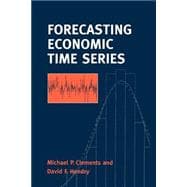
Note: Supplemental materials are not guaranteed with Rental or Used book purchases.
Purchase Benefits
What is included with this book?
| 1. An introduction to economic forecasting | |
| 2. First principles | |
| 3. Evaluating forecast accuracy | |
| 4. Forecasting in univariate processes | |
| 5. Monte Carlo techniques | |
| 6. Forecasting in co-intergrated systems | |
| 7. Forecasting with large-scale macro-econometric models | |
| 8. A theory of intercept corrections: beyond mechanistic forecasts | |
| 9. Forecasting using leading indicators | |
| 10. Combining forecasts | |
| 11. Multi-step estimation | |
| 12. Parsimony | |
| 13. Testing forecast accuracy | |
| 14. Postscript. |
The New copy of this book will include any supplemental materials advertised. Please check the title of the book to determine if it should include any access cards, study guides, lab manuals, CDs, etc.
The Used, Rental and eBook copies of this book are not guaranteed to include any supplemental materials. Typically, only the book itself is included. This is true even if the title states it includes any access cards, study guides, lab manuals, CDs, etc.